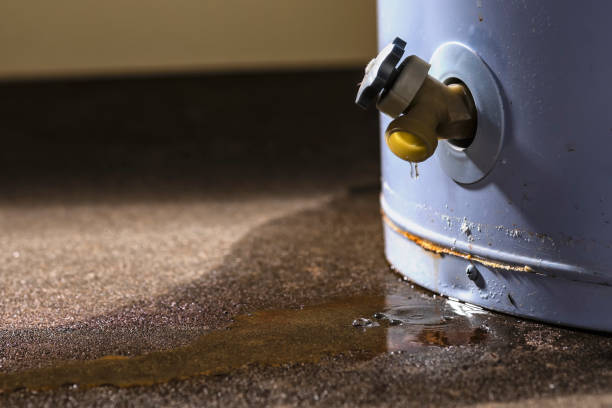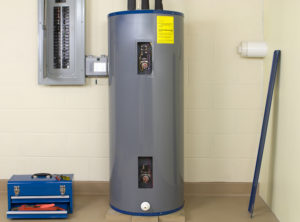Important Protocols for House Owners Managing Malfunctioning Water Heaters
Important Protocols for House Owners Managing Malfunctioning Water Heaters
Blog Article
What're your thoughts and feelings about Water Heater Burst?

Whether it is located in the cellar or a different space, broken water heating systems can trigger tension. Having no warm water supply is additionally problematic.
Shut Down Source Of Power
Before calling the plumber, shut off a gas water heater by turning the temperature level dial. This will certainly avoid electrocution, particularly if there is a leak as water is a conductor. Usually, the home heating component shuts off when the water hits a specific temperature.
Cut Off the Cold Water Supply
Cut off the containers faucet water supply from the source. This goes from your primary water line into the storage tank. When your storage tank is in good condition, the cold water stops filling when the tank is complete. Yet considering that it is leaking, the water will remain to move. Close the valve found at the top of the heating system. Revolve this clockwise to shut it off. If you can not locate it or reach it, you need to turn off that primary supply of water line outside your property.
Call the Plumber
After doing the first two security actions, you need to call your plumber to come immediately to fix a burst hot water heater. Bear in mind that your device will certainly not just conk out dramatically overnight. There are generally indications that your aging water heater has debris accumulation in the inside. Keep in mind of the following:
Do not wait on major flooding to call the plumber. By then, you will need to spend more to restore your residential property. Instead, as soon as you identify these indicators, have a professional pertained to evaluate your hot water heater say thanks to. Commonly, water heaters have a life-span of regarding 8 to 12 years. With normal evaluation and upkeep, you can lengthen its life.
Tidy up Residential property
After calling the plumber, paper damages by taking notes as well as images so you can claim your house owner's insurance policy. Remove any type of standing water to stop mold and also mildew development. If you have a submersible water pump, use that to drain the water.
Bear in mind, if you observe any type of problems with your water heater, call the pros right away. You can not take this trouble lightly since a faulty thermostat can increase water temp to a precariously high level, leading to accidental burns.
Whether it is situated in the cellar or a different space, broken water heating systems can create tension. Prior to calling the plumber, closed off a gas water heater by turning the temperature level dial. After doing the first two security steps, you have to call your plumber to come right away to take care of a burst water heating unit. If you have a submersible water pump, make use of that to drain the water. Remember, if you notice any kind of issues with your water heating unit, call the pros right away.
Is My Water Heater Broken?
The Water Heater is Old
No appliance will last forever. This includes a home’s water heater. During its lifespan, residents are going to face a situation where a new water heater installation will be necessary. The biggest problem with this is that most people are not sure when their water heater expires. Not knowing this can lead to serious risks if the unit begins to act up due to old age.
Most makes and models of water heaters will last between eight and 10 years. While 10 years is the age when water heater replacement is highly recommended, the need to replace the unit may occur before this time or after. If the unit doesn’t show any symptoms of a problem, it is a good idea to replace it at the 10-year mark (from the manufacture date).
Some of the symptoms that indicate a new unit is needed include rusting, leaks, noises, and a failure to heat up the water. Also, note that not all units have a 10-year life expectancy. The main exception to this rule is that a gas unit will last for six to eight years.
Rusty Heater Inlet Valve or Water
While steel is the strongest material on earth, it does have a weakness – rust. If corrosion occurs on a steel surface, it will begin to spread and eat through the steel in certain areas. On water tanks and pipes that are made of steel, rust is a warning sign of an impending leak.
The issue for many is trying to figure out if the rust is coming from the water heater or the pipes that lead to the faucet. If rust is seen, it is a clear indication that water heater service from the professionals is needed.
If rusty water appears out of the faucets in the bathtub or sink, it likely means a rusty water heater. If there is rust near the water inlet or the pressure relief valve, rust has likely developed inside the tank. If tap water appears rusty, it may be an issue with the pipes.
Strange Sounds from the Water Heater
Are there strange sounds coming from the tank? As a water heater gets older, rumbling noises may develop and get louder and louder as the water in the tank heats up. In homes where large amounts of hot water are used, the issue is likely going to be even more obvious when more serious issues arise. If there is a strange or loud noise coming from the unit, it is probably because of sediment buildup. A good way to remedy this problem is by flushing the heater. If this does not work, then a new unit may need to be installed.
Leaks
As a water heater gets closer to the end of its useful life, there is a higher chance there will be water around the tank. If there is water, this usually means leaks are occurring. Based on where the unit is located in the home, a leak may result in serious property damage.
Leaks are usually caused by expansions in the metal tank. The expansions occur as time passes and as the inside body of the tank is exposed to multiple heating cycles per day. When a fracture forms, the gap will be slight enough to hold the water in; however, in more serious situations, this will not be the case. If the tank is idle, the water will not leak but when the metal expands during each heating system, small amounts of water will get through the gap.

Do you appreciate more info about Broken Water Heaters? Put feedback further down. We would be delighted to find out your ideas about this piece. Hoping that you visit us again later on. Remember to take a moment to share this page if you appreciated it. Thank you for your time. Visit again soon.
Professional touch awaits. Report this page